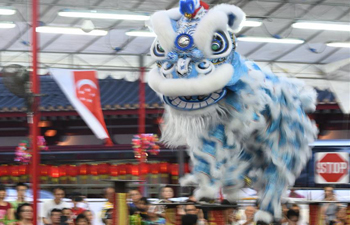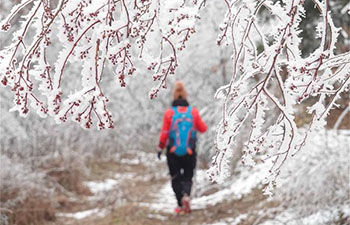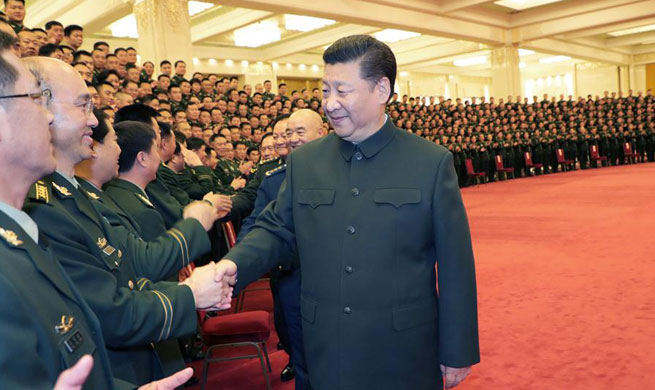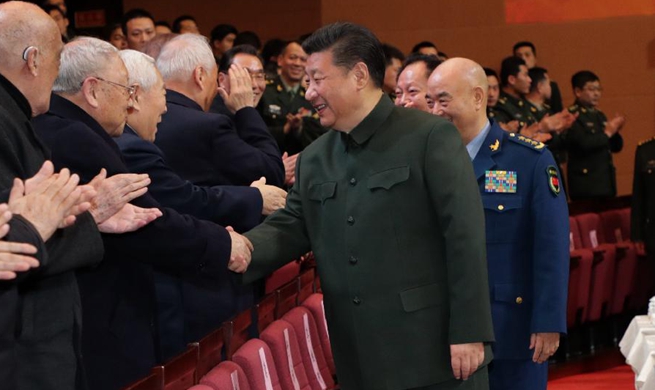by Xinhua writers Xu Zeyu and Huang Pengfei
FUZHOU, Feb. 4 (Xinhua) -- Drops of blood, tubes for assay and a few days of waiting: a tailored prescription for cancer is only a genetic test away.
As World Cancer Day draws near, targeted cancer therapy is helping with China's war on cancer.
"Thanks to targeted therapeutic medicines, the median survival time of Chinese terminal lung cancer patients has been extended from one year to three years," said Zhou Caicun, a leading oncologist at Shanghai Pulmonary Hospital.
In targeted therapies, cancer patients are categorized into various gene mutations through testing, and oral medicines targeting each mutation will be prescribed accordingly.
"This personalized approach proves much more effective than the previous 'one-size-fits-all' treatment," Zhou said.
Chemotherapy, the traditional first line cancer treatment, has been infamous for its adverse effects such as hair loss and nausea. Whereas targeted therapeutic drugs bring onslaught to cancer cells with much less collateral damage to healthy ones and therefore inflict less pain.
The hospital where Zhou works received 14,000 cancer patients last year, 40 percent of whom adopted targeted therapies. Currently, most tertiary referral hospitals in China can offer such services.
China has long been mired in the fight against cancer. A report published by the National Cancer Center in 2017 showed that China has nearly 40 percent of the world's cancer population, with 10,000 cancer patients newly added per day. In 2015, Chinese cancer patients' five-year survival rate was only 36.9 percent, about half that of the United States.
China's blueprint for health care development "Healthy China 2030" aims to raise the five-year survival rate by 15 percentage points by 2030. Ever since 2005 when targeted therapeutic drugs made the first foray into the Chinese market, the rate for Chinese terminal lung cancer patients alone has been raised from 8 percent to 18 percent.
"Despite an early entry, it was only recently that targeted therapies have became widely accepted by Chinese," said Gu Yutong, a pulmonologist in the Xiamen branch of the Zhongshan Hospital affiliated to Fudan University.
For some time, this approach was costly. The monthly expense of Iressa, Tarceva and Conmana, three most frequently prescribed drugs for EGFR mutations, ranged from around 2,000 to 3,000 U.S. dollars.
"Some desperate patients even turned to online overseas purchase for bargains, but they often were at the mercy of unqualified middlemen and ill-qualified drugs," Gu said.
China's national medicare, however, began to cover 16 brands of targeted therapeutic drugs last year and their prices dropped 44 percent on average. Some drugs are even cheaper than chemotherapy.
As the market expands, home-grown medical enterprises are keen to make technological breakthroughs. Betta Pharmaceuticals based in the eastern city of Hangzhou has launched a self-developed targeted therapeutic drug, making China the world's third country to possess such a capability.
Also, Shenzhen-based BGI, China's top gene-sequencing provider, is developing the core technologies for next-generation gene sequencing, the well-recognized future for genetic testing.
Zheng Limou, who spent some 20 years in the United States for biomedical research and business, returned home in 2008 to set up a medical company. Now, the PCR assay for genetic testing his company offers boasts 70 percent of market share in China.
"I saw the potential of targeted therapy in China. And more importantly, I believe it is the future for cancer treatment," Zheng said.

















